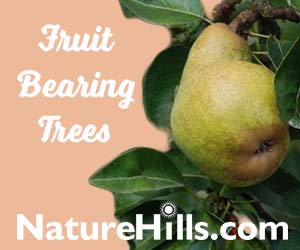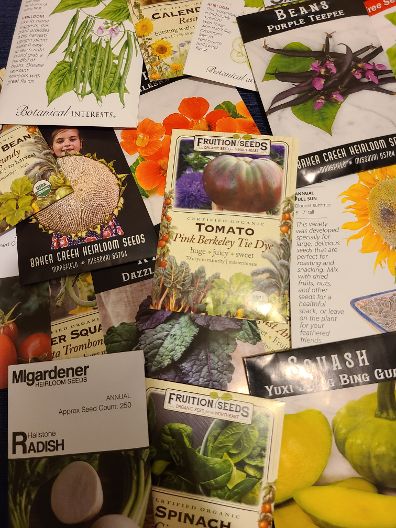I’ve always grown most of my vegetables from seed, whether planted inside or out. Over the years, I’ve fully embraced organic and heirloom seeds both for my health and the health of the planet. The companies I buy from have changed too. So, I’m sharing my favorite garden seed sources.
This post contains affiliate links from which I can earn a commision, at no cost to you. Visit my full disclosure page here.

Seed Terminology
When we talk about buying seeds, here’s a few terms it helps to understand.
Organic
Farmers harvest organic seeds from plants that have been grown organically. Any pesticides used must meat organic certification requirements. Buying organic seeds supports organic farmers and sustainable farming.

Open-Pollinated
Open-pollinated seeds are pollinated naturally by self-pollination, insects or birds.
Heirloom
Heirloom seeds come from open-pollinated plants that have been grown for over 40 years. Seeds saved from heirlooms will produce plants that are similar to the parent, called breeding true. Though, if you’re interested in saving seeds from your plants, you’ll need to protect against cross-pollination. Heirloom seeds generally develop more resistance to local diseases and stressors. Because they’ve been selected for taste and nutrition, instead of being shelf stable, you’re likely to enjoy heirloom fruits and vegetables even more.

Cross-Pollination
Cross-pollination occurs when pollen from one plant variety spreads to similar plants. Plants grown from cross-pollinated seed will still produce the same type of vegetable, but there will be more variety in characteristics. Some plants, like cucumbers, are more prone to cross-pollinating than others. If you want to save seeds from your plants, you’ll want to protect them from cross-pollination. Because each fruit or flower produces many seeds, you only need to put a cover over a few of the flowers.
Conventional
Conventionally grown plants are likely sprayed with non-organic pesticides. Seeds from these plants are not approved for organic gardening.

Read more about container gardening or winter sowing!
GMO
Genetically modified seeds can use metals or bacteria to introduce different genetic material to the seeds and plants. The biggest concern with GMO plants are all the roundup ready seeds from Bayer/Monsanto. These seeds are designed to make the plants able to withstand massive applications of the pesticide glyphosate. Glyphosate is now found in many breakfast cereals, like Cheerios and Quaker Oats, and even Sabra hummus. Corn and soybean are almost exclusively grown this way.
But, rest assured, it’s very unlikely you’ll find this type of seed for your garden. GMO seeds are epensive to produce and controlled by the company. Still, most garden seed purveyors guarantee no GMO seeds.
Hybrids
Hybrids can be created by intentional cross pollination to increase desired traits like color, flavor, or disease resistance. If you purchase F1 Hybrid seeds (first generation), you may not want to save the seeds that result from your plants since you may get very different results from the original. Hybrids need to go through multiple generations before the traits they’ve been bred for become reliable.

My Four Favorite Garden Seed Sources
MIGardener
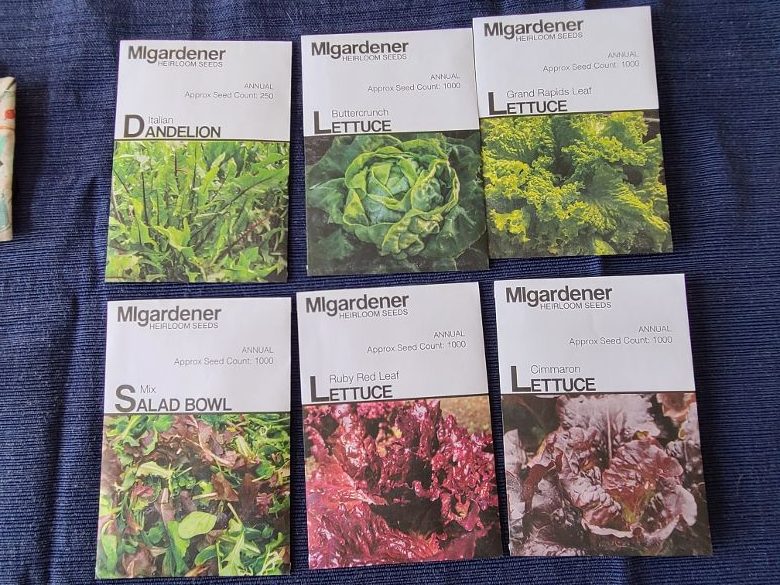
MIGardener Greens 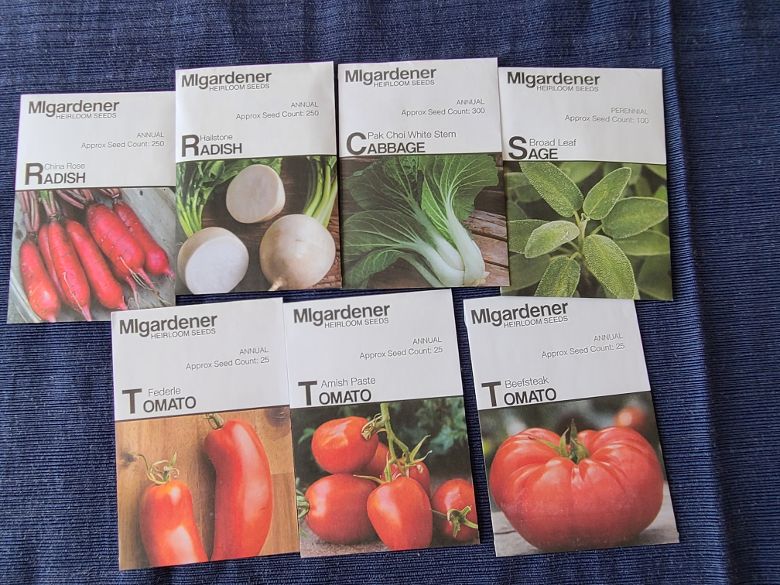
MIGardener Vegetables 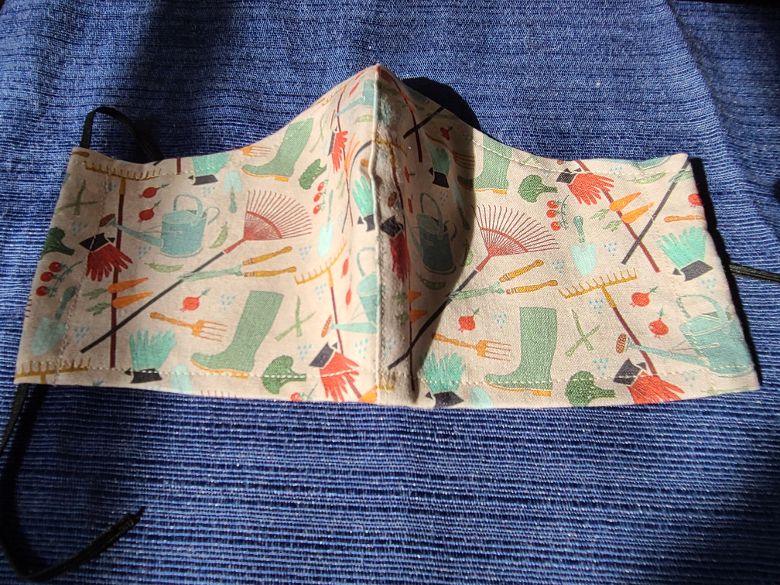
Garden themed mask from MI Gardener
Luke Marion started MIGardener in 2011 and offers premium, heirloom and organic seeds. Like all seed suppliers now, they are working hard to get orders filled, but many varieties are out of stock. I signed up for the wait list for some seed varieties, and already heard one is back in stock. MIGardener charges $2 per seed packet with 25 seeds on average. That value makes it easy to try new vegetables on a small basis. I first heard about MIGardener from my favorite you-tuber, Jess, at Roots and Refuge Farm.
This is my third year ordering from them. I’ve had very good results with most of their seeds. Michigan has some pockets of zone 6b, which I have here in Connecticut, so these seeds are suitable for my area too. This year, I even ordered a cute, garden-themed mask from their site! My order arrived in 8 days.
Botanical Interests
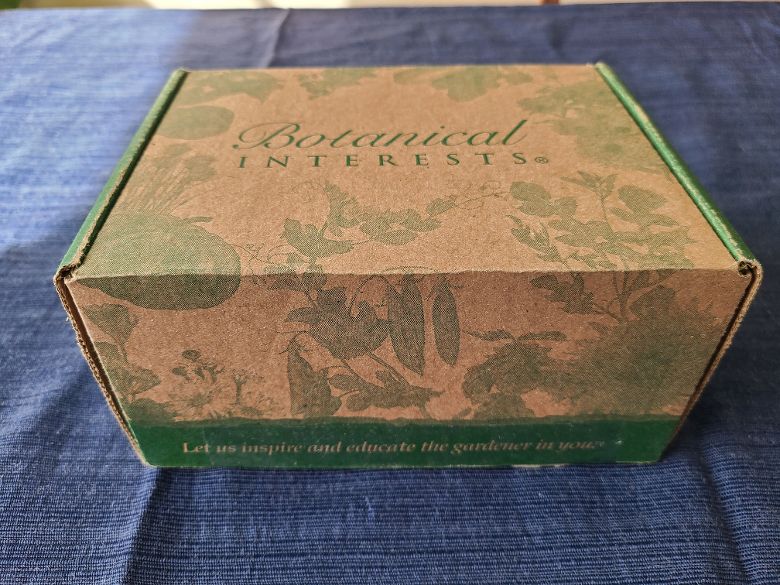
Resusable packaging 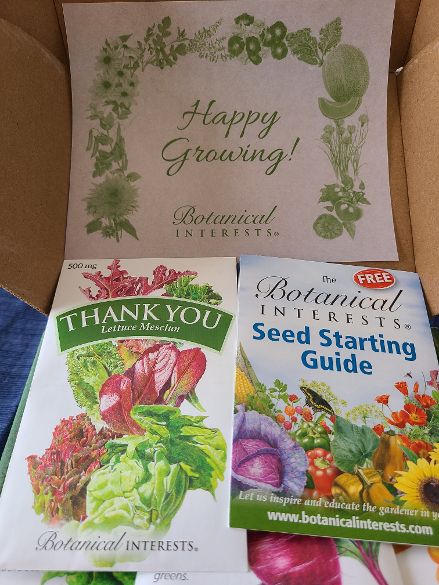
Extras from Botanical Interests! 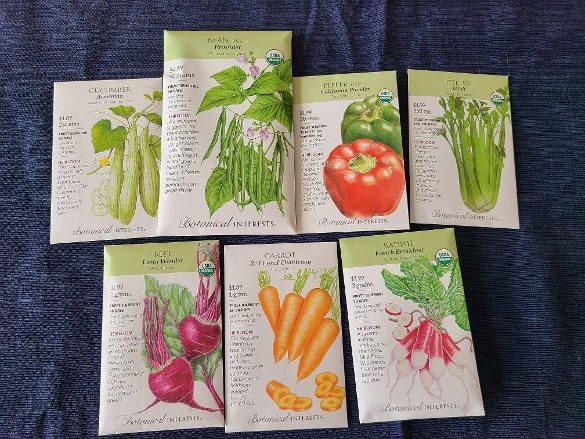
Botanical Interests Vegetables 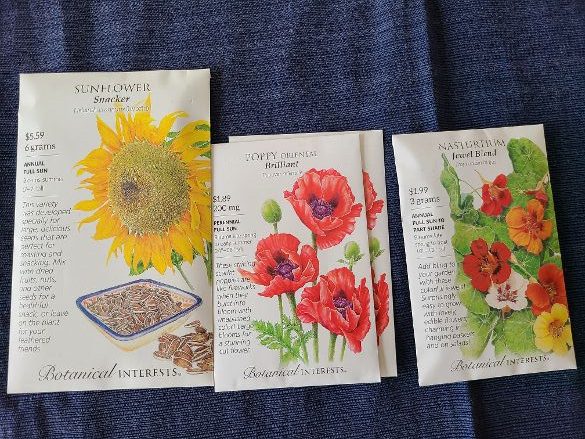
Botanical Interests Flowers 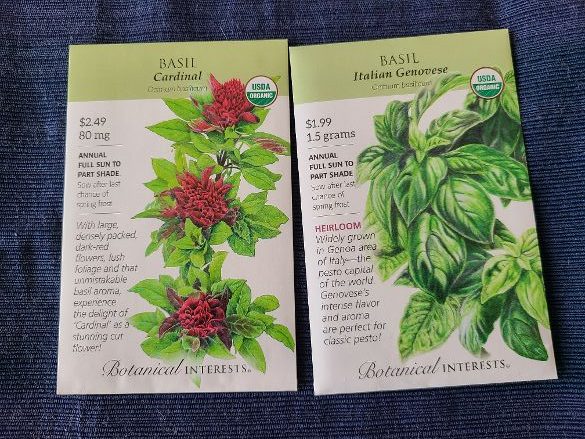
Botanical Interests Herbs 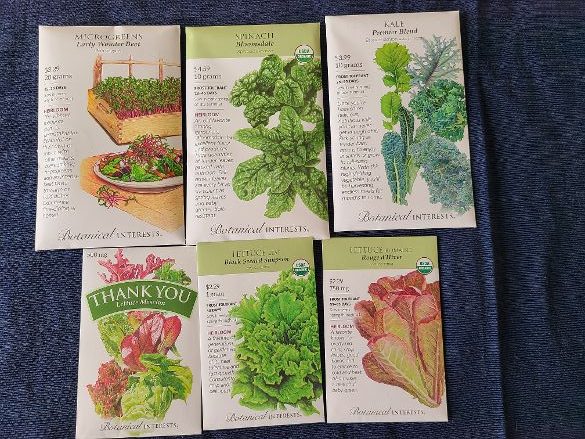
A couple in Colorado started Botanical Interests 25 years ago. They’ve grown into a large supplier. You can find Botanical Interests seed displays in many garden centers. I’ve used their seeds for years with very good success. Now, they’re one of my affiliate marketing companies! So, if you click through the ad below, you’ll help me out and get reliable seeds. Be sure to take advantage of the free seed starting guide.
I placed an order back in January and received it in a reasonable amount of time. They’re now out of stock on many items, but they carry so many, you can find alternatives. They included a free packet of seeds in my order which was a nice surprise. Prices of seeds and number per packet vary widely but I consider them reasonable.

Fruition Seeds
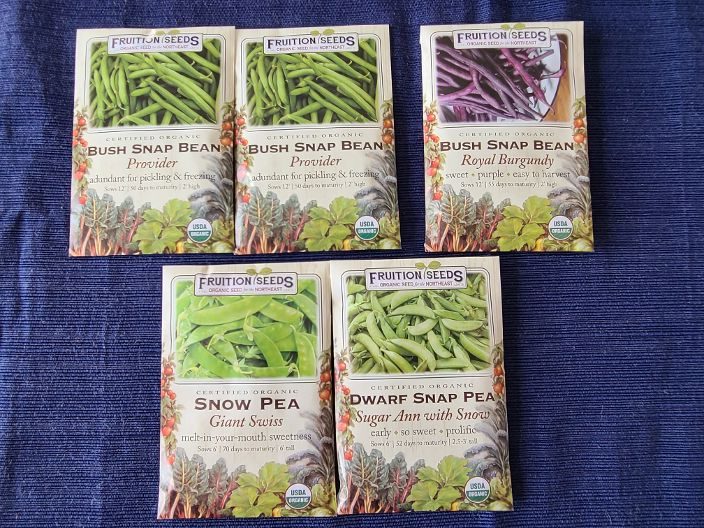
Fruition Seeds Beans and Peas 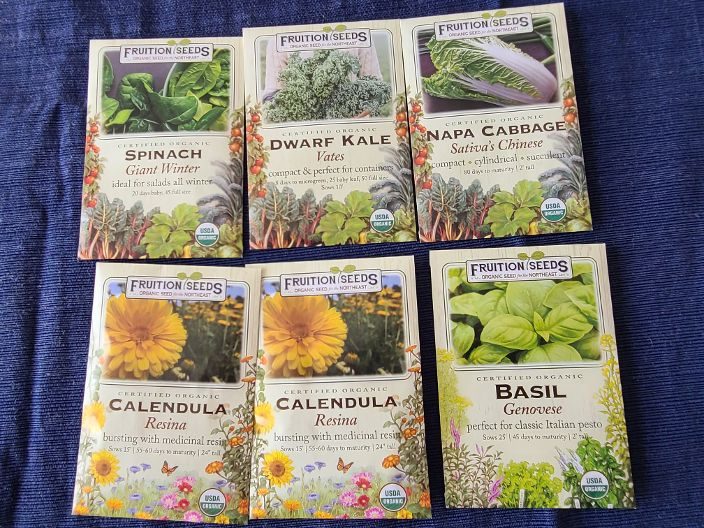
Fruition Seeds Greens and Herbs 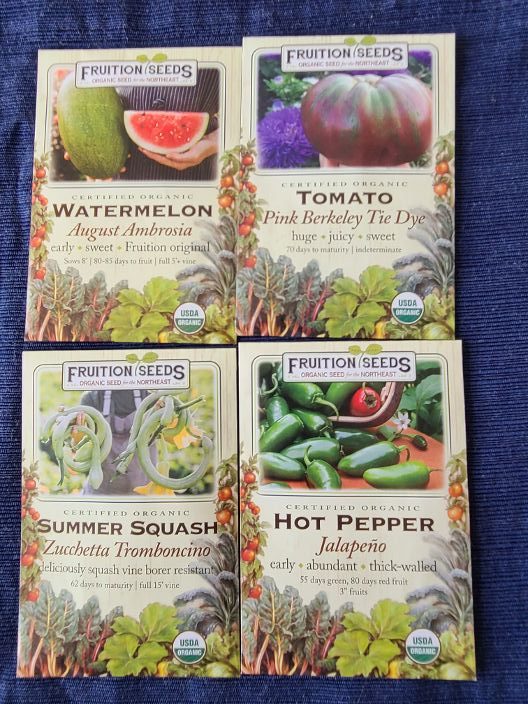
Fruition Seeds Vegetables
I discovered Fruition Seeds in 2017, at a flower show in Hartford. (My son, Will, won the tickets and gifted them to me!) Petra Page-Mann and Mathew Goldfarb were offering a special deal on their seeds and I was hooked. Fruition seeds are grown specifically for the Northeast and do extremely well for me. The website has gorgeous photography. Most seed packets are $3.79 and you can save with larger quantities of seeds. The order I placed recently shipped the next day and arrived in 4 days!
Petra offers an incredible array of educational resources including live webinars and Q&As to get your questions personally answered! Check out the free seed starting academy or click on Learn and find all their upcoming Sowing & Growing series events. Petra is a joy to listen to and her passion is inspiring.
Baker Creek Heirloom Seeds
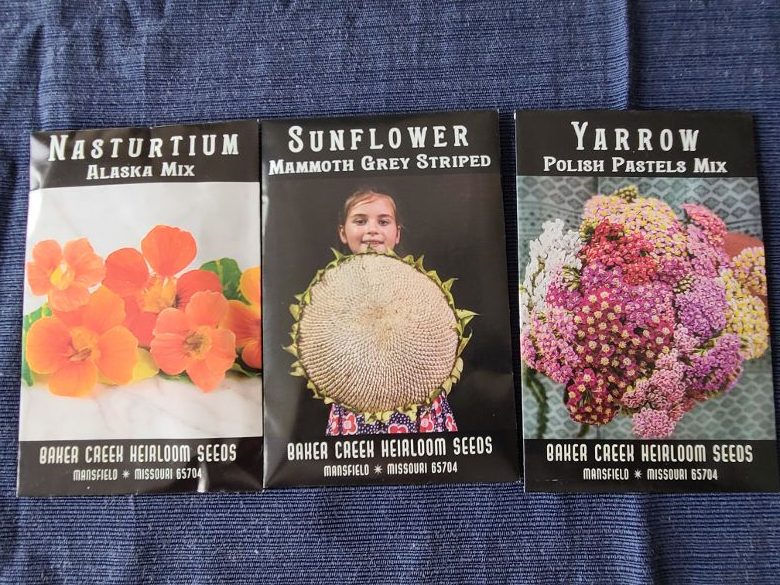
Baker Creek flowers 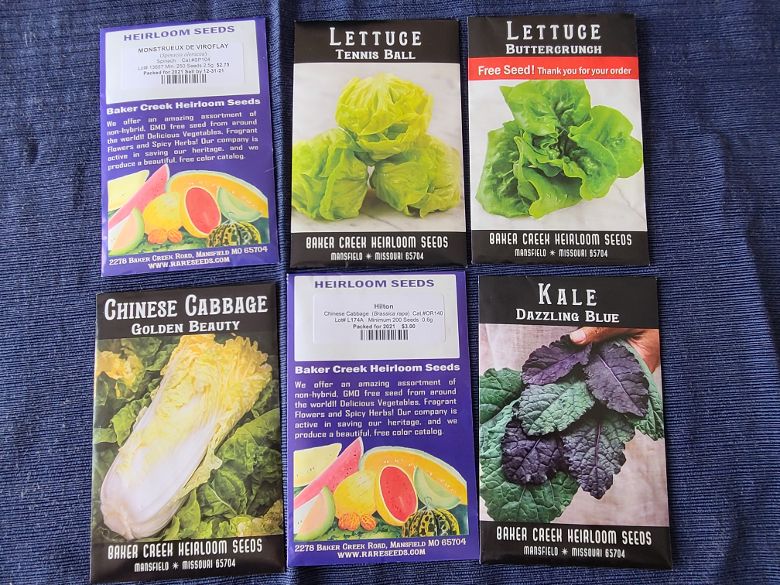
Baker Creek greens 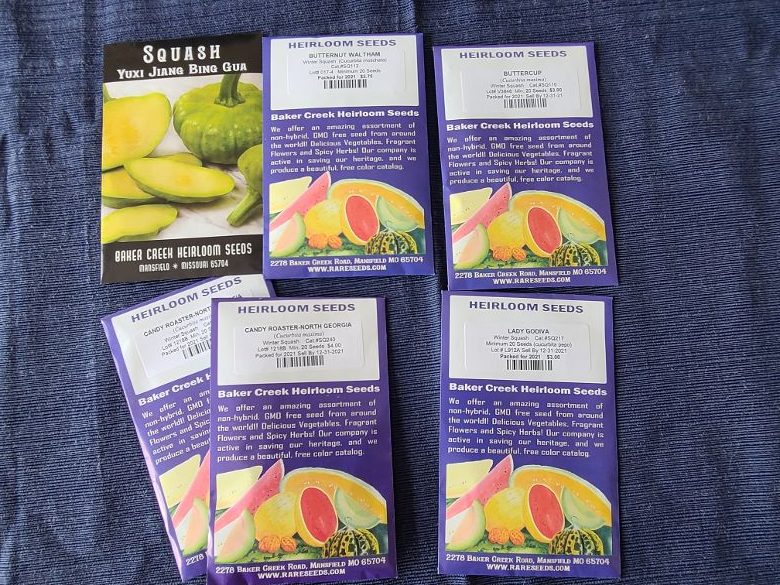
Baker Creek squash 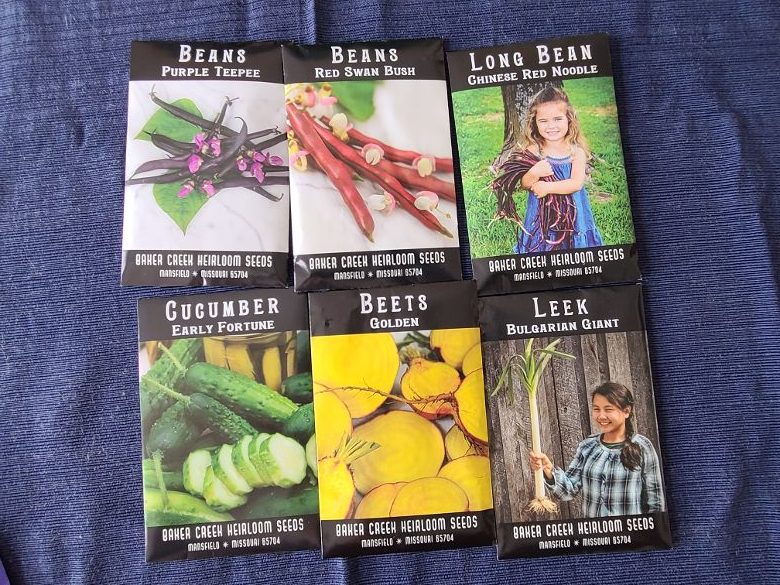
Baker Creek beans and more
Jere Gettle started Baker Creek Heirloom Seed Company in 1998. His goal was to provide seeds that can be saved and shared by anyone in resistance to corporate control of seeds. They are now the largest heirloom seed company in the world and help preserve many heirloom species.
When I ordered recently, the majority of seeds were in stock. Prices and seed quantities vary considerably depending on the rarity of the heirloom variety. My order arrived in 8 days, though the website now says to expect up to 30 days for orders to arrive in the U.S. I only ordered Baker Creek seeds once before, but they were among my favorites this past year.
Other Fine Garden Seed Sources
Johnny’s Selected Seeds is a 100% employee owned business. They have an excellent reputation. They are just about to open up for orders from home gardeners after prioritizing farmers’ orders.

High Mowing also has an excellent reputation. They offer seed packets for home gardeners and large quantities for farmers and homesteaders. They offer free shipping for orders over $25. Many seeds are out of stock or on back order, with anticipated shipping dates provided. I’m very impressed with the value pricing of their microgreen packets. I’ve just placed my first order with them and will update this post with feedback.
Hoss Tools Unless you’re ordering tools too (and they have great tools!), you’re not likely to hit the free shipping minimum of $99. Seed packets run around $3.99 for a good quantity of seeds. Some items are out of stock. I was delighted to discover Hoss Tools is part of my affiliate marketing group. So if you decide to place an order with them, please consider clicking through the ad below to support me a bit! I’m placing my first order with them this year.

Burpee has been around forever it seems. It’s easy to find their seeds, even at Acme Market which we have locally. I like to snag Burpee Organic seeds when Acme marks them down by 30-50%. Burpee offers both organic and heirloom seeds now, as well as conventional.
Hudson Valley is another company I want to support. They are well known for their beautiful seed packets designed by artists across the U.S.
Alternative Garden Seed Sources
Seed swaps are a great way to get seeds that have faced local disease, insect and weather issues. It’s a great way to save money too! Libraries in some communities may host seed swaps. I found someone on my local Buy Nothing group that’s offering seeds. You can also try Craigslist or Freecycle for free seeds. I’ve reached out to neighbors who garden to share or trade seeds (and plants). These may be great ways to meet people with similar interests too.

Are you growing vegetables this year? Please share your favorite garden seed sources in the comments!
For more on gardening, saving money, and sustainable living, please subscribe to my newsletter!

